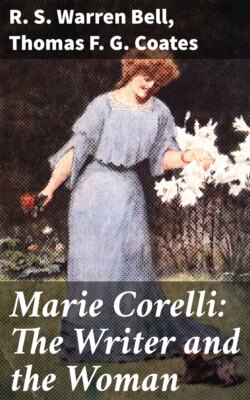Читать книгу Marie Corelli: The Writer and the Woman - R. S. Warren Bell - Страница 11
На сайте Литреса книга снята с продажи.
CHAPTER V
“ARDATH”—THE STORY OF A DEAD SELF—THE WONDERFUL CITY OF AL-KYRIS—THE MISSION OF THE BOOK
ОглавлениеTable of Contents
In no work produced by her busy pen has Miss Corelli given such range to her imagination, to her love of the beautiful and fantastic, as in “Ardath.” This, her fourth book, abounds in wonderful accounts of a strange people in a strange place. When she sets a scene of barbaric splendor in the city of Al-Kyris, she reaches great descriptive heights; she tells, indeed, a tale of beauty, of horror, and of extraordinary amours, whose like can nowhere be found, look where you will. “Ardath” stands alone—a prose poem and a startlingly vivid narrative in one. “I have read it,” wrote Mr. Bentley (referring to the work in manuscript form), “with wonder that one small head could hold it all.”
That the authoress has a quick and appreciative eye for the picturesque, her most bitter detractor will not care to deny; she loves to write of birds and flowers, field and forest, golden sunshine and blue waters. She exhibits a passion for the bygone—in architecture and in man. In her interesting miscellany, “A Christmas Greeting,” she reproves those who would take from the charming old-worldliness of Shakespeare’s birthplace by erecting in Stratford-on-Avon ugly villas and shops suggestive of Clapham or Peckham Rye. She would—as we all would—have Stratford kept as much as possible like Stratford was when Shakespeare wandered by Avon’s banks or brooded over the fire in his home near to the old Guild Church.
“Ardath” was written in a hot glow of inspiration. Its theme is drawn from the Book of Esdras, one of the apocryphal Jewish writings which, while not used for “establishment of doctrine,” are held to be of value for historical purposes and for “instruction of manners.” Like a constantly recurring refrain in a musical composition, the passage in Esdras chosen by the authoress for her text greets the reader ever and anon as he turns the pages: “So I went my way into the Field which is called ‘Ardath,’ and sat among the flowers.”
On this passage Miss Corelli built her romance, and so successfully did she work out her ideas that “Ardath” drew letters from all sorts and conditions of men—letters discussing the theories propounded in her writings, and asking for information and advice of encyclopædic character. Amongst the
A Boating Place on the Avon
A Favorite Reach on the Avon
correspondence were many flattering letters from men and women of light and leading, not only in England, but abroad. The novel under notice, which was issued in 1889, brought Miss Corelli a letter of praise from Lord Tennyson. The work was indeed so remarkable a piece of imaginative conception and picturesque writing that it appealed peculiarly to the Laureate’s sense of the poetic and artistic.
Of the mission of the book, which was of serious character, we shall speak anon. “Ardath” is one of the author’s finest efforts to further the cause of true religion. A strange outcome of the book was the proposed building, by some enthusiastic Americans, of a Corelli city in Fremont County, Colorado, U. S. A., on the Arkansas River, and a prospectus was actually issued explaining the project.
“Ardath” is divided into three parts. In the first is introduced a sceptic poet, Theos Alwyn. In the Second Book, Theos is transplanted into the city of Al-Kyris, in a bygone world, where he is supposed to have led a previous existence five thousand years before Christ’s advent. In the Third Book, Alwyn is back in London, amongst old associates, with the knowledge of all these strange experiences within him. The book has a sub-title, “The Story of a Dead Self,” and it is in the city of Al-Kyris that the peculiar “Dead Self” experience comes to Theos Alwyn, through whom Miss Corelli expounds lessons to all men—and women.
The story opens in the heart of the Caucasus Mountains, where a wild storm is gathering, and there is an early example of the descriptive delights with which the book is adorned. Miss Corelli is unique, not alone in her imaginings and in her treatment of them, but, too, in her powerful pictures of scenery. Here,
